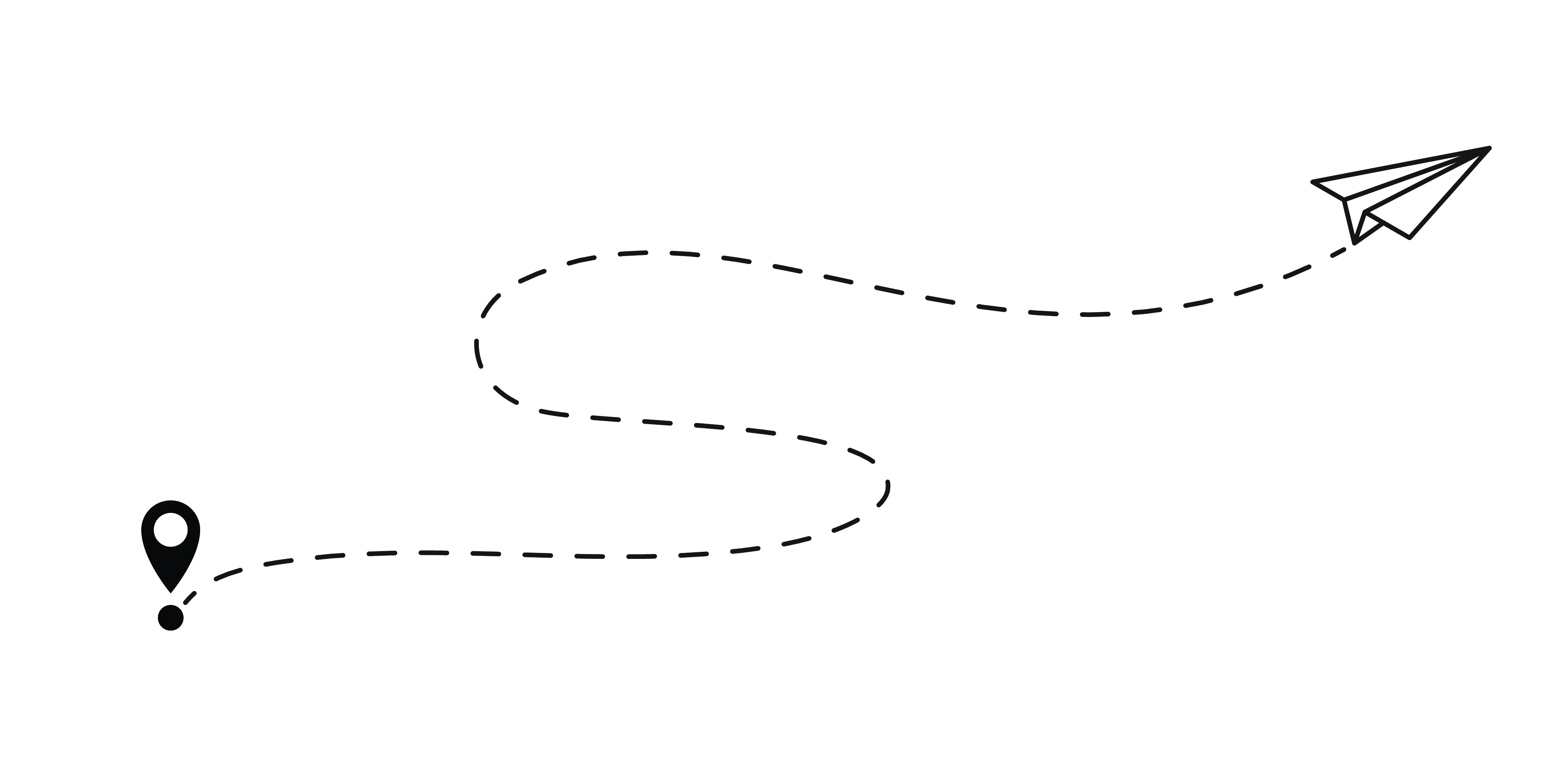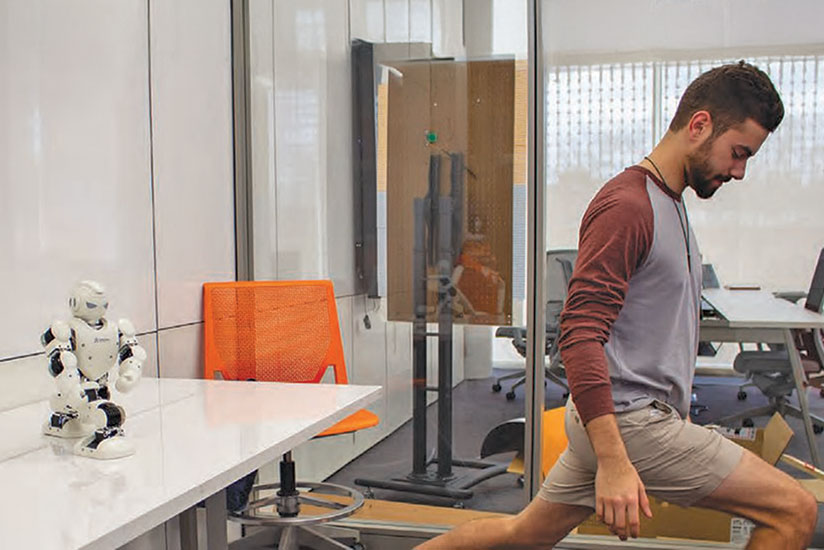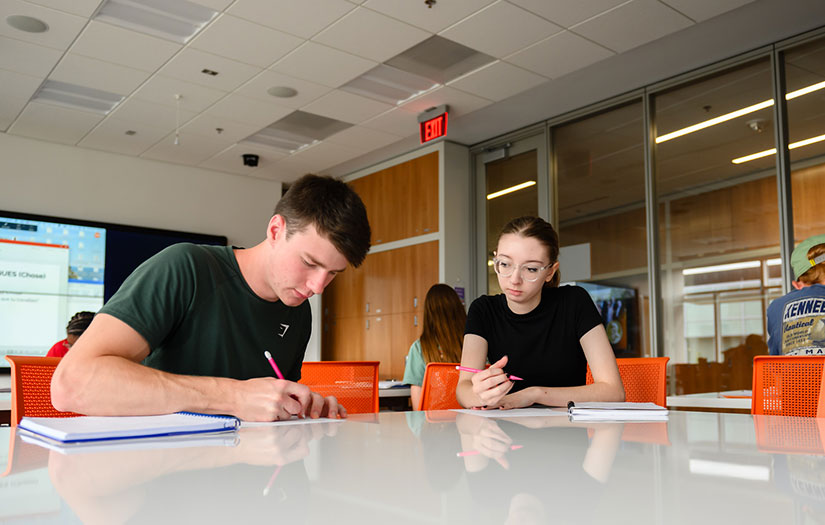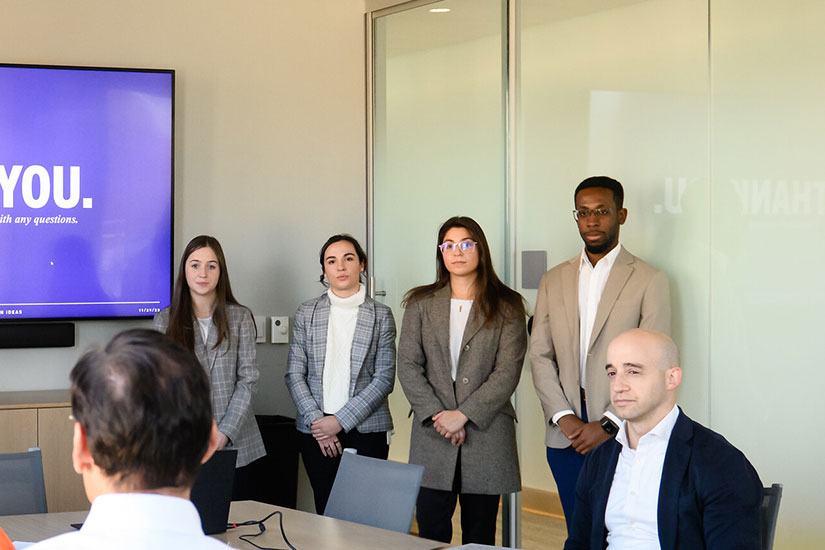First-Year Pathways
Which Path Should I Take?
When choosing which path to take in the general engineering program, the best choice depends on individual preferences and learning styles. Students should consider their academic goals, social commitments, and financial situations when deciding what the first year in the program will look like.

First-Year Course Options
GELC Program Curriculum Option
✅ Desire a more structured learning environment
✅ Want to study with a cohort of engineering students
✅ Benefit from additional academic support and resources
✅ Enjoy collaborative learning experiences
✅ Easier access to peer study groups
✅ Need additional mathematics prep before core engineering courses
✅ Extended support available in the summer following your first year
Summer Entrance Programs
✅ Want to get a head start on college coursework
✅ Prefer a less intense Fall semester workload
✅ Opportunity to acclimate to college life before fall term
✅ Potentially graduate earlier or more flexibility later
✅ Smaller class sizes during the Summer Session
Standard General Engineering Curriculum
General Engineering provides students an opportunity to explore various engineering fields while getting a sound academic preparation for engineering study.
All new engineering students, including transfer students, are admitted into the General Engineering program. Students remain in General Engineering until they are able to declare their chosen major. This requires that the core courses are completed with a C or higher and the grade-point average requirement is met. The minimum cumulative grade-point average is 2.00 unless otherwise stated by the major. Some majors specify a higher minimum grade-point average or additional requirements. Please see individual majors for details.
First Semester
- 4 - CH 1010 - General Chemistry
- 3 - ENGL 1030 - Composition and Rhetoric
- 3 - ENGR 1020 - Engineering Disciplines and Skills *
- 4 - MATH 1060 - Calculus of One Variable I *
- 3 - Arts and Humanities Requirement or Social Science Requirement
Credits: 17
*Alternative courses may satisfy this requirement, or specific majors may require alternative courses. Please see the requirements for each major or consult an advisor.
Second Semester: Track Options
There are two possible pathways through the second-semester first year curriculum, depending on the specific engineering major a student intends to pursue beginning sophomore year. Note that Computer Engineering and Electrical Engineering allow students to follow either path; all other engineering majors require either Path 1 or Path 2 only. For students enrolled in GELC, the two pathways for the second semester of first year and the required summer curriculum are shown at the bottom of this section.
Track 1 (Biomedical, Biosystems, Chemical, Computer, Electrical, Environmental, Materials Science)
- MATH 1080 - Calculus of One Variable II (4 cr)
- PHYS 1220 - Physics with Calculus I (3 cr)
- CH 1020 - General Chemistry (4 cr)
- Arts and Humanities or Social Science Requirement (3 cr)
Programming Requirement
- ENGR 1410 - Programming and Problem Solving (3 Cr) or
- CHE 1300 - Introduction to Chemical Engineering 2 Credits and CHE 1350 – Programming and Problem Solving for Chemical Engineering (1 Cr)*
*Chemical Engineering only
---Major Exploration
- Biomedical Engineering only - BIOE 1010 (1 Cr)
- Computer Engineering or Electrical Engineering only - ECE 2000 (1 Cr)
Credits: 17-18
Track 2 (Automotive, Civil, Computer, Electrical, Industrial, Mechanical)
- MATH 1080 - Calculus of One Variable II (4 cr)
- PHYS 1220 - Physics with Calculus I (3 cr)
- PHYS 1240 - Physics Laboratory(1cr)
- ENGR 1410 - Programming and Problem Solving (3cr)
- Arts and Humanities or Social Science Requirement (3 cr)
Engineering Graphics Requirement
- Automotive Engineering and Mechanical Engineering - ENGR 2080 – 2 credits
- Civil Engineering - ENGR 2100 – 2 credits
- Computer Engineering, Electrical Engineering, and Industrial Engineering - ENGR 2080 – 2 credits or ENGR 2100 – 2 credits
Credits: 16
NOTE: Courses and credits may vary depending on individual student requirements.
Please view the course catalog for available substitutions and the latest curriculum.
Clemson CatalogGeneral Engineering Learning Community (GELC) Program
General Engineering Learning Community (GELC) is designed to meet you where you are. Whether you're concerned about your math skills, unsure about college-level courses, or simply want to start strong, GELC provides the support you need. GELC services are provided at no extra charge. You get enhanced support and a community of like-minded peers without any financial burden.
GELC Semester Courses
Fall Curriculum
- ENGR 1000 [1] Major Discovery Seminar
- ENGR 1010 [3] Engineering Applied Math
- ENGL 1030 [3] Accelerated Composition or Gen Ed if ENGL completed
- ENGR 1100 [2] Engineering Success Skills (Part 1 of 2)
- ENGR 1510 [3] First-Year Engineering (Part 1 of 3)
- CH 1010 [4] General Chemistry I
16 credit hours
Second Semester: Track Options
Spring Curriculum
Track 1 (Biomedical, Biosystems, Chemical, Computer, Electrical, Environmental, Materials Science)
- ENGR 1110 [1] Engineering Success Skills (Part 2 of 2)
- ENGR 1520 [2] Engineering Computer Skills (Part 2 of 3)
- MATH 1060 [4] Calculus of One Variable I
- PHYS 1220 [3] Physics with Calculus I
- CH 1020 [4] General Chemistry II
- Arts and Humanities or Social Science Requirement [4]
Major Exploration
- Biomedical Engineering only - BIOE 1010 [1]
- Computer Engineering or Electrical Engineering only - ECE 2000 [1]
Credits: 17-18
Note: Courses and credits may vary depending on individual student requirements.
Track 2 (Automotive, Civil, Computer, Electrical, Industrial, Mechanical)
- ENGR 1110 [1] Engineering Success Skills (Part 2 of 2)
- ENGR 1520 [2] Engineering Computer Skills (Part 2 of 3)
- MATH 1060 [4] Calculus of One Variable I
- PHYS 1220 [3] Physics with Calculus I
- PHYS 1240 [1] Physics Laboratory
- Arts and Humanities or Social Science Requirement [4]
Engineering Graphics Requirement
- Automotive Engineering and Mechanical Engineering - ENGR 2080 – 2 credits
- Civil Engineering - ENGR 2100 [2]
- Computer Engineering, Electrical Engineering, and Industrial Engineering - ENGR 2080 – [2] or ENGR 2100 – [2]
Credits: 16
NOTE: Courses and credits may vary depending on individual student requirements.
Summer Curriculum
- ENGR 1640 [3] First-Year Engineering (Part 3 of 3) or CHE 1300 [2] Introduction to Chemical Engineering and CHE 1350 – Programming and Problem Solving for Chemical Engineering [1]
- MATH 1080 [4] Calculus of One Variable II
Credits: 7
Please view the course catalog for available substitutions and the latest curriculum.
Clemson Catalog GELC Program OverviewSummer Entrance Program
Incoming students with strong academic backgrounds may consider getting a head start on their engineering education by enrolling in introductory courses during summer sessions. While this option can be beneficial, it's important to carefully evaluate your readiness and circumstances before making this decision. Summer engineering courses are intensive and fast-paced, requiring significant time commitment and self-discipline.
Steps to enroll in GE summer courses
- If you need to switch your enrollment term to summer, you can do so in your Clemson admissions portal. This must be completed before you can register for summer classes.
- Talk with a General Engineering (GE) advisor before you register. Advisors will discuss how these summer courses affect your fall schedule. You may reach an advisor by emailing geadvising@clemson.edu.
- Start the orientation process early so you can be advised and register for both Summer and Fall classes before summer classes begin. Look for GE summer classes and pay particular attention to the start and end dates so that you register for the correct session.
- Register for your summer courses using Clemson’s IROAR. You need your Clemson username and CID.
- Find information for paying tuition and other fees on the Summer Start webpage.
- Check your email for updates. Once registered, you are listed on the instructor’s roster. The instructor will contact you about course needs, syllabus, and any additional instructions, which will be listed in Canvas by the first day of class.
We encourage you to review the FAQ information thoroughly to determine if summer coursework aligns with your academic preparedness, summer commitments, and long-term educational goals. This careful consideration will help ensure that you make the best choice for your successful transition into Clemson's engineering program.
Summer PathwaysSummer ENGR 1020 Considerations FAQ
How does ENGR 1020 impact a student's Clemson academic record?
- The course provides official Clemson credit and impacts your cumulative GPA.
- Credit hours for summer will count toward the 30 credit hours needed for renewal eligibility required for Life (get help from financial aid)
- For Palmetto Fellows scholarship begins counting credits with your first Fall. (get help from financial aid).
What is the protocol for online tests and exams?
- Students enrolled in online classes are monitored by a proctor. Students will need to find a testing center to proctor exams. Check with the course coordinator for ENGR 1020 to confirm.
- Specific details and requirements can be found in the course syllabus.
What should incoming students know about the online ENGR 1020 summer course?
- The course is asynchronous and does not have a set meeting time, allowing flexible daily access to lectures.
- Expect daily lectures and potential assignments Monday through Friday.
- Course content is gradually released throughout the term; early completion is not possible.
- Virtual office hours are available for questions and assistance.
- The pace is accelerated, equivalent to one week of regular term content every two days.
What grade do students need in ENGR 1020?
- A grade of C or higher is necessary to progress in General Engineering courses.
How challenging is the ENGR 1020 course material?
- Students with AP/IB backgrounds, particularly in physics, chemistry, and math, may find much of the content familiar.
- For those without AP/IB experience, the material may be more demanding.
- Plan to dedicate 6-8 hours daily to coursework.
- Consistent effort throughout the week is crucial; avoid last-minute cramming.
Are there students who should reconsider taking summer ENGR 1020?
- Students without STEM AP/IB class experience may find the course particularly challenging.
- Those with extensive summer commitments, travel plans, or full-time jobs should carefully consider their ability to meet course demands.
- The course requires significant time and attention to succeed.
What are the prerequisites for ENGR 1020?
- Eligibility to enroll in MATH 1040 or 1060 is required.
- A grade of C or higher is necessary to progress in General Engineering courses.
Optional Courses to Enhance Your Degree
Creative Inquiry
Creative Inquiry (CI) is the imaginative combination of engaged learning, cross-disciplinary interactions, and undergraduate research unique to Clemson. Faculty mentors lead team-based investigations, which can span one semester to a year or more. Students take on problems that spring from their own curiosity, from a professor's challenge, or the world's pressing needs around them. Please view the General Engineering list of CI Projects and follow the instructions to sign up for one of those courses. For a full list of all current projects at the University, visit Creative Inquiry Projects.
GE-Specific Projects All CI Projects

ENGR 1000 - Major Discovery Seminar
ENGR 1000 provides a unique window into Clemson's diverse engineering disciplines through engaging presentations from industry professionals and distinguished faculty. This interactive seminar helps you make informed decisions about your engineering path while gaining valuable insights into career opportunities, allowing you to align your passions with the right engineering specialization early in your academic journey. For students wondering if they will choose the optimal engineering path, this course offers exposure to real-world applications and career trajectories across all engineering disciplines.
Explore CECAS Major EventsEngineering Leadership Minor
Clemson's Engineering Leadership Minor transforms technically skilled students into influential industry leaders through specialized coursework and direct engagement with successful professionals. This targeted program combines technical expertise with essential leadership skills - from effective communication to strategic decision-making. Through real-world case studies, industry mentorship, and practical leadership experiences, you'll develop the confidence and capabilities that top engineering firms actively seek.
Engineering Minor Clemson Minor Offerings
